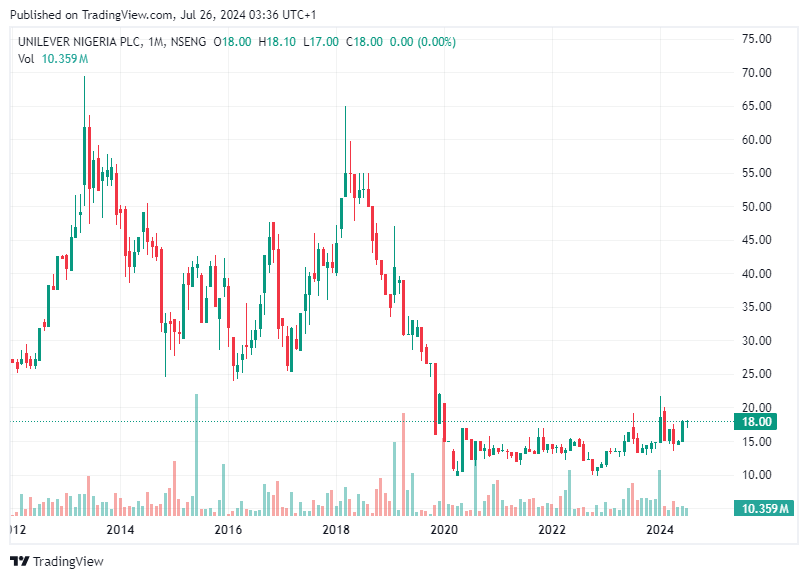Global Consumer Company Margin Improves: Shares Rise
Unilever's Margin Improvements Drive Share Rise Despite Sales Miss.

Disclaimer: The financial information and statements provided in this article are based on data available as of July 25, 2024. Investors should conduct their own thorough research before making any investment decisions. The author is not liable for any actions taken based on the content of this article.
Real-time information is available daily at https://stockregion.net
Unilever, a global leader in consumer goods, recently reported its financial performance for the first half of the year. While the company's underlying sales growth slightly missed forecasts, its shares experienced a notable rise. This positive market response was driven by analysts' praise for the company's margin improvements.
Financial Performance Overview
Unilever, known for iconic brands such as Marmite, Dove, and Ben & Jerry's, reported an underlying operating profit increase of 17.1% year-on-year, reaching €6.1 billion (£5.14 billion) for the period ending June 2024. This impressive profit growth was accompanied by a 2.5-point rise in profit margins to 19.6%, surpassing analyst expectations. The company's ability to enhance its profit margins despite modest sales growth highlights its operational efficiency and strategic pricing decisions.
Analysts lauded Unilever's ability to improve its margins, which led to a 6% increase in the company's shares on Thursday morning. The rise in profit margins was attributed to "carry-over pricing from a period of higher inflation" and efficiency gains from selling more products and premium brands. Hein Schumacher, Unilever's chief executive, emphasized that the company had not passed on all of the inflationary impact to consumers, signaling a balance between maintaining profitability and consumer affordability.
Market Challenges and Regional Performance
While Unilever's overall financial performance was strong, the company faced challenges in specific markets
The US beauty market experienced a slowdown, impacting Unilever's sales in this segment. Despite this challenge, the company's diversified portfolio and strong presence in other categories helped offset some of the adverse effects.
In south-east Asia, Unilever's sales were partly affected by a consumer boycott of western brands due to geopolitical events in Gaza. This regional disruption reveals the complexities of operating in diverse and politically sensitive markets. Unseasonable weather in Europe led to a 1% decline in ice-cream sales. Additionally, challenging market dynamics in China resulted in lower Cornetto sales. Despite these setbacks, Unilever remains "on track" to demerge its ice-cream business, including brands like Magnum and Wall's, by the end of 2025.
Unilever's performance stood in contrast to that of its rival, Nestlé. The latter warned that its sales growth for the next six months would be a quarter less than anticipated at 3%. Nestlé's pet food, ice-cream, and nutrition sales lagged behind expectations, with analysts pointing to soft demand in China and tough price competition elsewhere. Jefferies analysts noted "signs of slashed pricing" and concerns about brand strength in the new environment, where cost-of-living pressures prompted consumers to consider supermarket own-label alternatives.
Future Outlook and Initiatives
Looking ahead, Hein Schumacher expressed confidence that Unilever's profit margins would remain robust, projecting at least 18% margins in the second half of the year. The company anticipates continued price increases across the grocery industry, ranging from 2% to 3% into the next year.
Fernando Fernandez, Unilever's finance director, highlighted that price rises were underpinned by wage inflation. He noted that not all additional costs would be passed on to consumers, as Unilever aims to maintain brand competitiveness. Schumacher added that the group observed increasing promotional activity in Europe and deflation in some developing markets, such as India, while promotions remained steady in North America. Unilever's ongoing operations in Russia have attracted controversy, especially as many western brands have pulled out since the invasion of Ukraine. Schumacher explained that Unilever had "localized operations" in Russia and aimed to "minimize economic contribution" to the state. He acknowledged the complexity of the situation and assured stakeholders that the company closely monitors its operations there.
The company's focus on efficiency, premium branding, and balanced pricing strategies has positioned it favorably in a competitive landscape. While regional market disruptions and geopolitical factors present ongoing challenges, Unilever's proactive measures and forward-looking initiatives provide a strong foundation for sustained growth.
Disclaimer: The financial information and statements provided in this article are based on data available as of July 25, 2024. Investors should conduct their own thorough research before making any investment decisions. The author is not liable for any actions taken based on the content of this article.
Real-time information is available daily at https://stockregion.net


